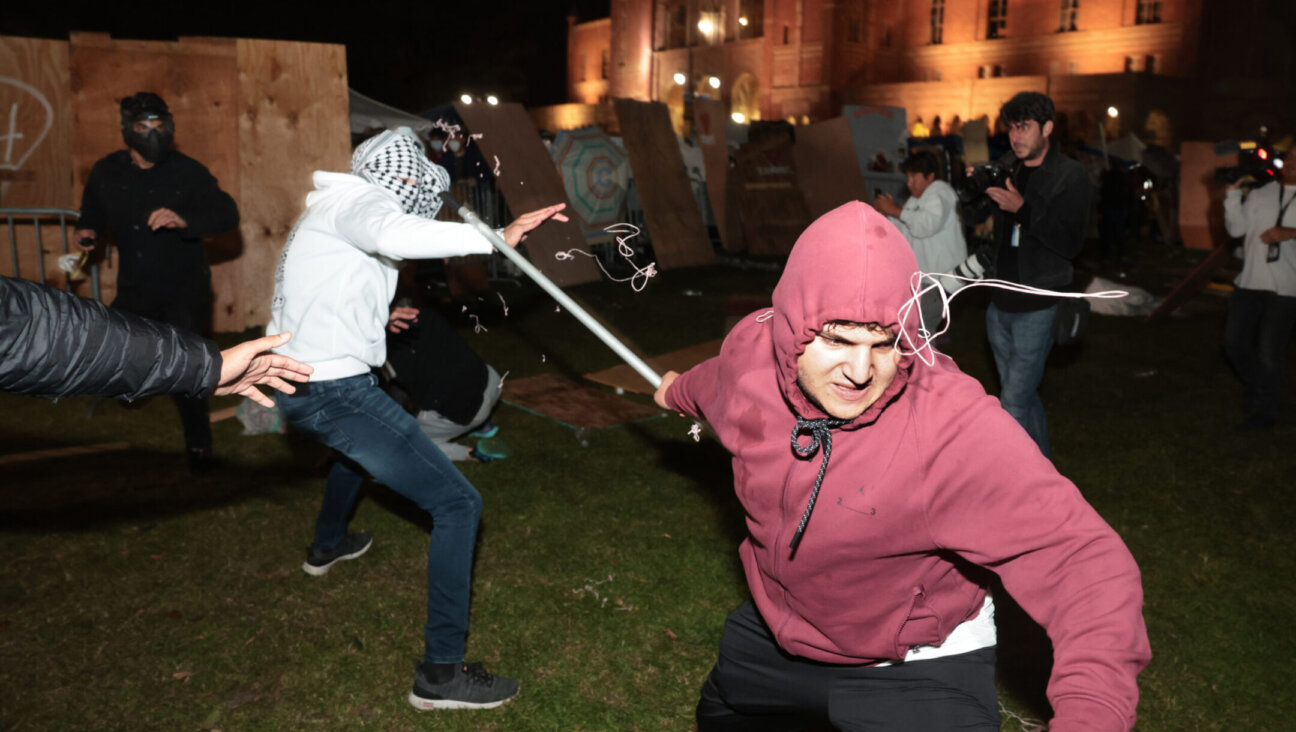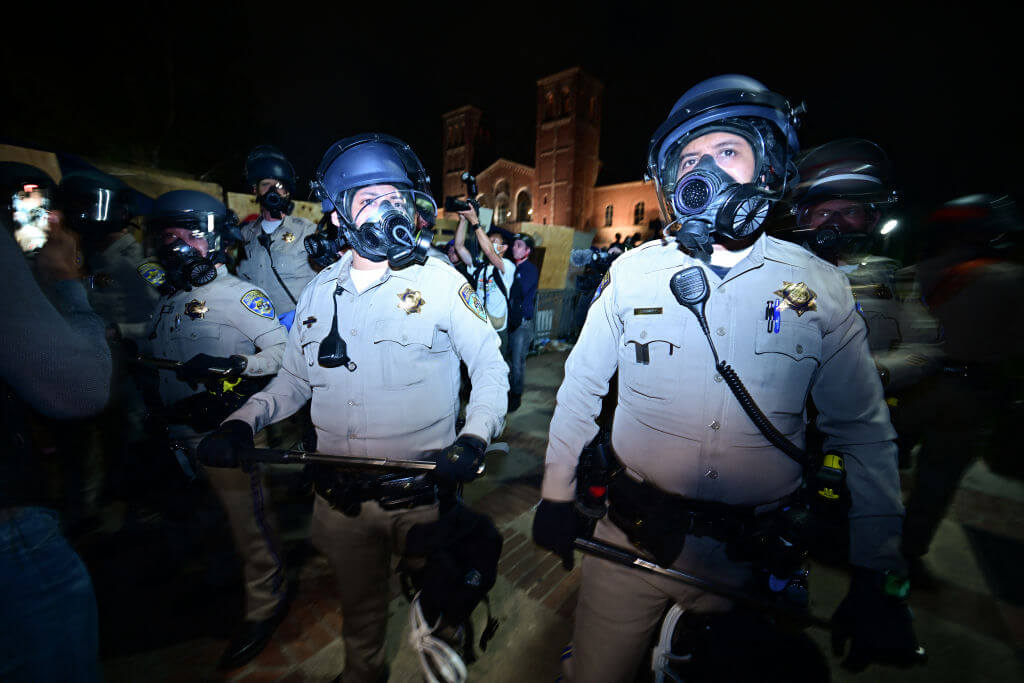‘It’s just more death’: Hundreds more rabbis demand ceasefire as call gains mainstream traction
More than 600 Jewish clergy have signed either the Rabbis for Ceasefire declaration or the new letter from T’ruah, a rabbinic human rights group
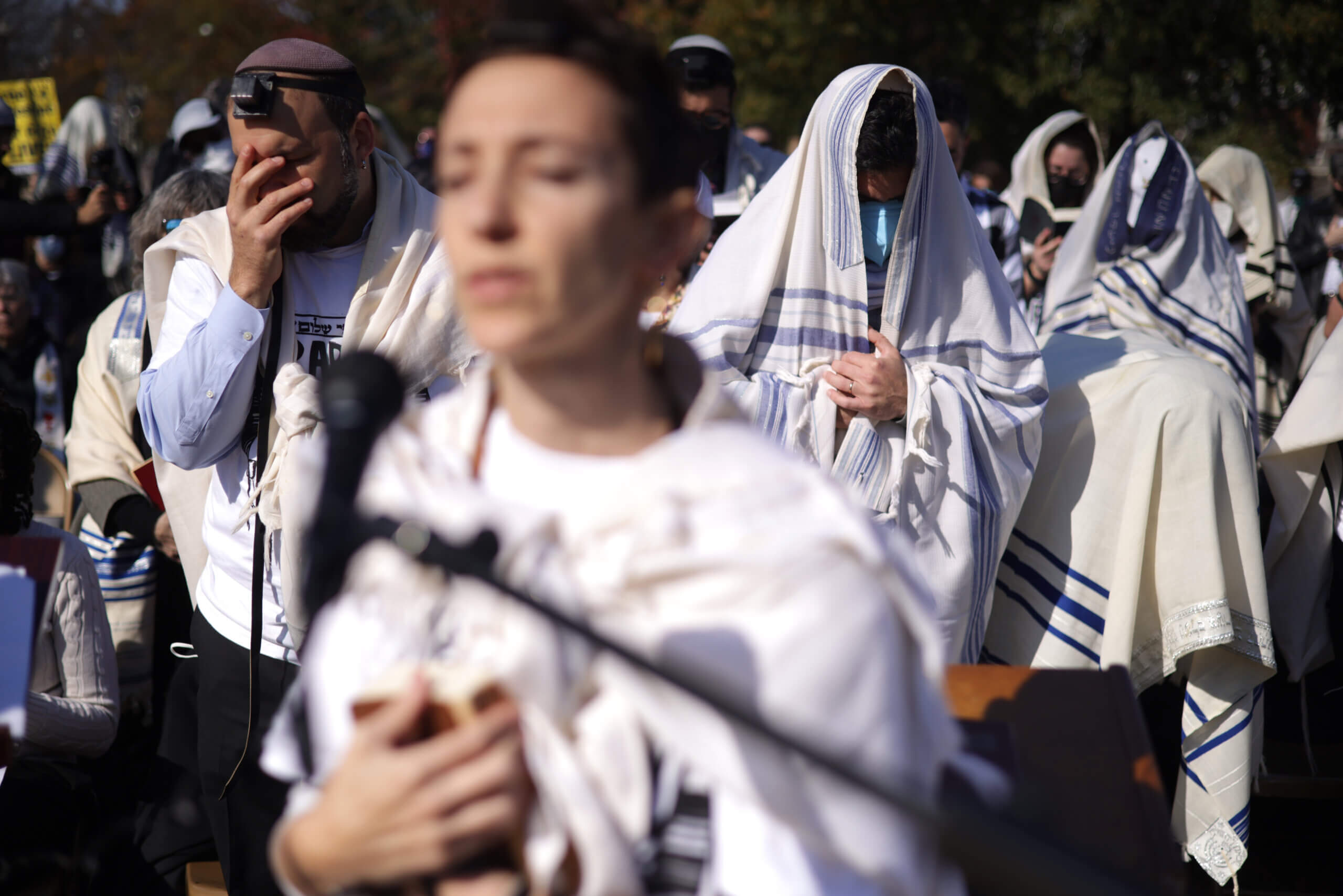
Rabbi Yoseph Berman a Jewish morning prayer service near the U.S. Capitol in November as part of a demonstration with Rabbis for Ceasefire. Berman also signed onto a ceasefire letter Friday organized by T’ruah, a liberal rabbinic group. Photo by Getty Images
More than 450 rabbis called on President Joe Biden Friday to end the war in Gaza, adding momentum to growing calls for a ceasefire among liberal American Jews who have become deeply uncomfortable with Israel’s military operation.
“There is no military solution to this conflict,” the rabbis, including leaders of large synagogues, stated in a letter organized by T’ruah, a rabbinic human rights group. “A ceasefire is the only reliable, proven means for securing the release of the remaining hostages and ensuring the provision of desperately needed humanitarian relief to Gaza.”
Pro-Palestinian activists, including some progressive Jews, rallied behind the call for a ceasefire almost immediately after the Oct. 7 Hamas terrorist attack that killed an estimated 1,200 people in southern Israel.
But despite regular criticism of the Israeli government, liberal Jewish groups like T’ruah, a network of more than 2,300 rabbis, have been reluctant to use the “ceasefire” language — and affiliate themselves with the larger protest movement against Israel — even as they began expressing doubts about Israel’s war effort in the late fall and winter.
That reluctance appears to have diminished in recent weeks. A February poll found that 50% of American Jews supported a ceasefire, compared to 34% that opposed it. Rabbis for Ceasefire, an independent group formed in late October with several dozen clergy behind it, now has 311 signatories.
Rabbi Alissa Wise, who founded the group, said 50 of those sign-ups came last week, after Israeli soldiers fired at Palestinians gathered around an aid convoy in Gaza.
A weekly ceasefire rally in New York City organized by Israelis for Peace has drawn new supporters recently, including Rabbi Rachel Timoner, who joined Sunday to call for an end to the war.
“For a long time I did not use the word ‘ceasefire,’ because it was being used by people who celebrated Oct. 7,” said Timoner, who leads Congregation Beth Elohim in Brooklyn. But “continued war and Israeli occupation of Gaza will be an unmitigated disaster.”
Two days later, New York Jewish Agenda, a progressive group Timoner co-founded, joined a coalition of leading liberal Zionist groups including J Street, the Reconstructionist movement and the New Israel Fund to send Biden a letter calling for a ceasefire.
Signatories to Friday’s ceasefire letter organized by T’ruah included Timoner, along with other prominent rabbis including the leaders of B’nai Jeshurun and Temple Shaaray Tefila, two of the oldest synagogues in Manhattan.
More than 600 Jewish clergy have signed either the Rabbis for Ceasefire declaration, an earlier and more forceful condemnation of Israel, or T’ruah letter calling for a ceasefire.
“It’s an important moment to take note that so many religious leaders in the Jewish community are seeing this as an opportunity to save life, the primary duty in the Jewish tradition,” said Ken Chasen, senior rabbi of Leo Baeck Temple, a major Reform synagogue in Los Angeles, who signed the T’ruah letter.
Different motivations drive signatories
Rabbi Jill Jacobs, CEO of T’ruah, released a December statement calling for a temporary ceasefire to allow the release of more hostages, and said that in the weeks that followed she has heard from many of the organization’s rabbis who wanted to attach their name to a ceasefire statement.
“There’s a difference between supporting military action in general and supporting this particular war and we’ve seen that shift over the last few months,” she said. “The situation on the ground has gotten much worse.”
Israel has killed an estimated 30,000 Palestinians in Gaza, according to health officials in the enclave, and global leaders have warned that children have begun dying of starvation due to the lack of humanitarian aid.
At least 247 Israeli soldiers have been killed in Gaza, while at least 30 of the remaining 136 Israeli hostages have died since the war began, according to intelligence officials.
T’ruah’s letter specifically calls for a negotiated “bilateral ceasefire,” more aid to Gaza and for Biden to continue pressuring the Israeli government against an invasion of Rafah, the city in southern Gaza where hundreds of thousands of Palestinians are sheltering.
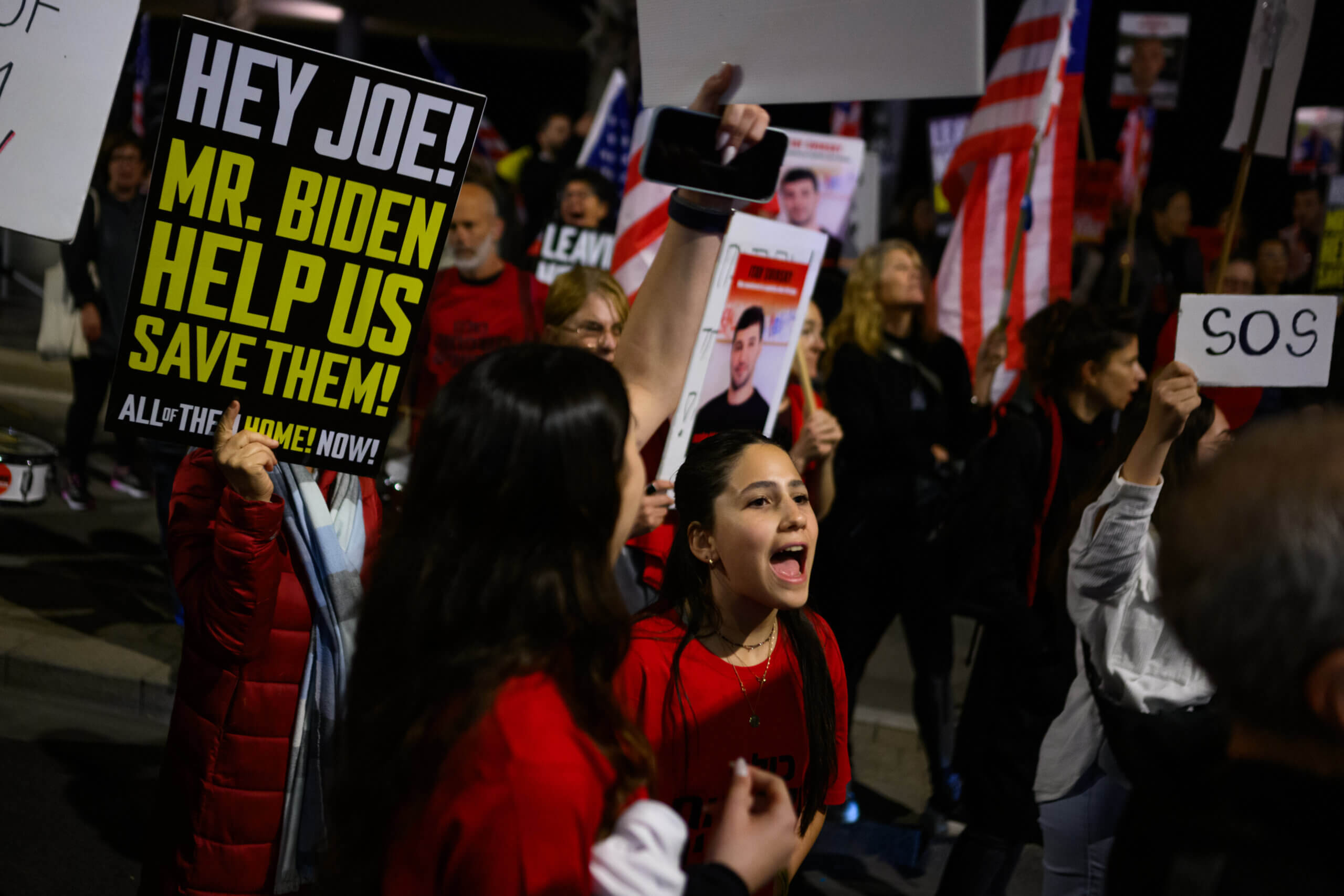
Some of those who signed, like Chasen at Leo Baeck Temple, said their top priority was the safety of the remaining hostages, whose families have mounted increasingly vocal demands for the Israeli government to secure their release with diplomacy in recent weeks.
“They’re the ones suffering on the front line of this awful horror,” Chasen said of the hostages. “We know — since Oct. 8 — the one time we saw hostages released in significant numbers came as a matter of ceasefire.”
Others said that, while they initially supported Israel’s military response to the Oct. 7 attack, the country’s stated goals of destroying Hamas and freeing the hostages no longer appear possible through war, and the humanitarian toll of the violence on civilians in Gaza has since outweighed any strategic benefit to Israel.
“The sense is that there is no goal to the war and it’s not winnable and it’s just more death,” said Rabbi Felicia Sol of B’nai Jeshurun, a non-denominational synagogue on the Upper West Side.
“There is an inordinate sacrifice of human life without end.”
Daniel Zemel, senior rabbi of Temple Micah, a Reform congregation in Washington, D.C., attended the March for Israel in November with a sign reading: “Hamas out of Gaza, Bibi out of Israel.”
Zemel said he still wants Hamas out of Gaza, but believes that if Israel continues the war it will only strengthen support for Hamas’ ideology. “The current government of Israel has done everything they can to ensure Hamas stays in power by responding to no sane plan that would create a more durable and peaceful situation,” he said. “That is immoral, reprehensible and destructive on so many levels.”
Questioning about timing of ceasefire call
Wise, the founder of Rabbis for Ceasefire, said she had mixed feelings about this week’s letters from T’ruah and the Progressive Israel Network, which Wise called “appallingly late.”
“We need all the voices we can get,” said Wise, a former executive at Jewish Voice for Peace, the anti-Zionist group that has helped lead calls for a ceasefire since October. “But it’s hard not to feel a sense of frustration and disappointment that it took them this long.”
Wise said using the specific term “ceasefire” was important because it was the rallying cry for a global movement calling for an end to the war, though she noted that even as more mainstream Jewish groups are starting to use the term they are separating themselves from the protest movement.
“They still have to draw this line in the sand,” she said. “They’re not joining the ceasefire movement, they’re calling for a ceasefire.”
Jacobs said that she wouldn’t change anything about T’ruah response to Oct. 7 and the subsequent war in Gaza.
“We never asked this government to carry out this war but the fact of the war was not unjust,” she said. “There’s not another action that a country could have taken in October and November, other than to go after Hamas.”
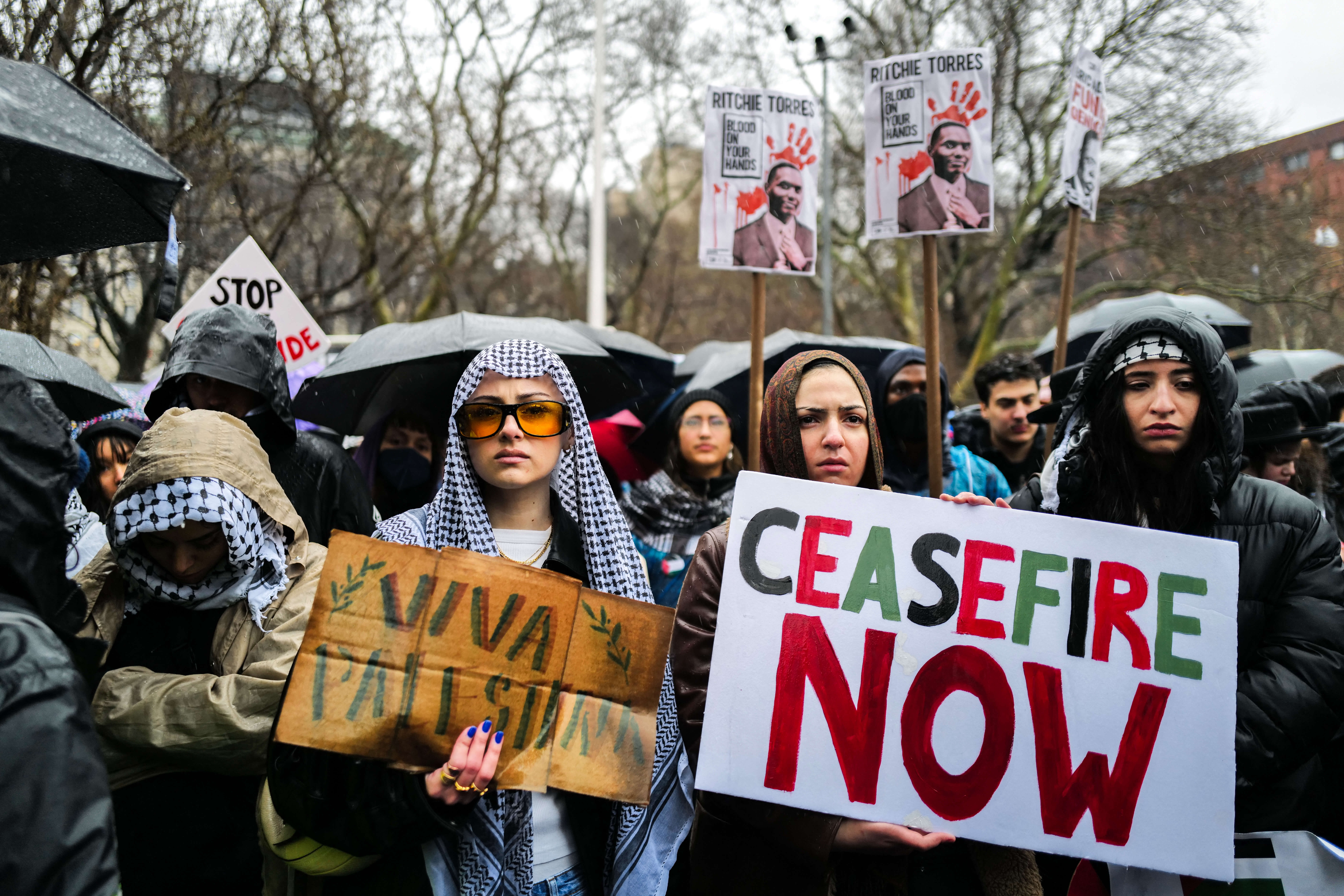
But Jacobs soured on the operation as it became clear that Israel was not “making strategic strikes, and was not concerned about collateral damage to Palestinian civilians.”
Asked why she believed that Israel could be persuaded to carry out the war in a more restrained manner given her organization’s lack of trust in its leadership, Jacobs said: “I think we thought that some cooler heads might prevail.”
Adina Vogel-Ayalon, vice president of J Street, the liberal pro-Israel group, offered a similar explanation for why her organization did not call for an end to Israel’s military campaign until January, and did not use the term “ceasefire” until this week.
Vogel-Ayalon said that she had “hopeful optimism” that Israel’s unity government — which includes members of the political opposition and former Israeli military leaders Benny Gantz and Gadi Eisenkot — would have a moderating influence on the far-right Israeli government.
Both the T’ruah and J Street ceasefire calls were addressed to the Biden administration, which has said that it is seeking a diplomatic solution to the conflict but has rebuffed protest leaders who want it to demand an immediate end to the war.
Zemel, the Washington rabbi who is also incoming co-chair of T’ruah’s board, said that despite his earlier support for the war he was now resolute in his belief that it must end.
“We supported a war to get rid of Hamas, we supported a war for Israel to defend its border, we supported a war to get the hostages back,” he said. “It’s become a war of simple destruction.”







